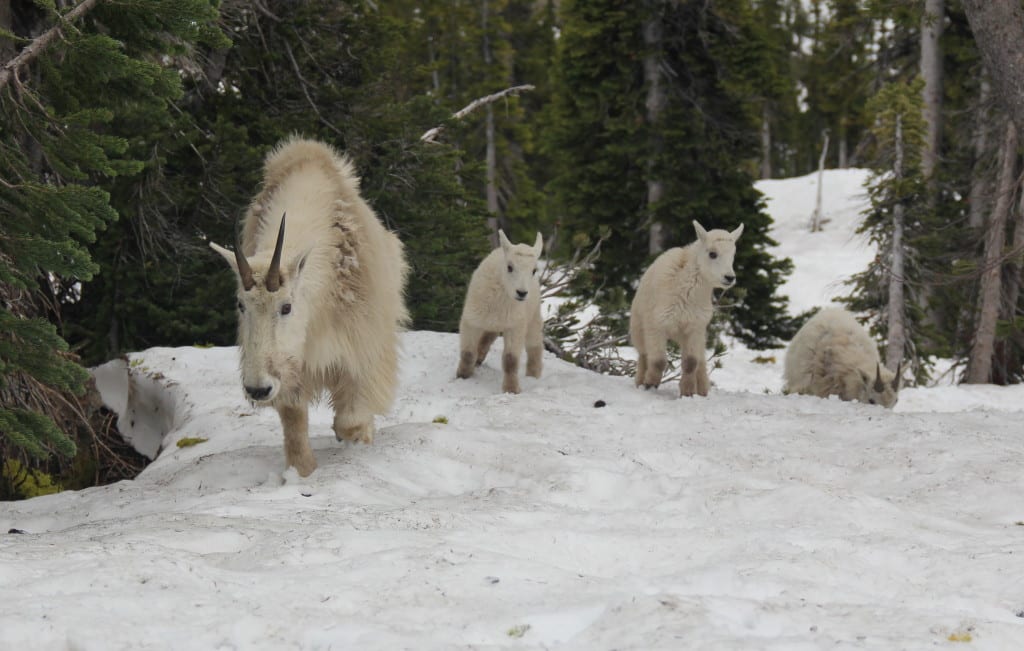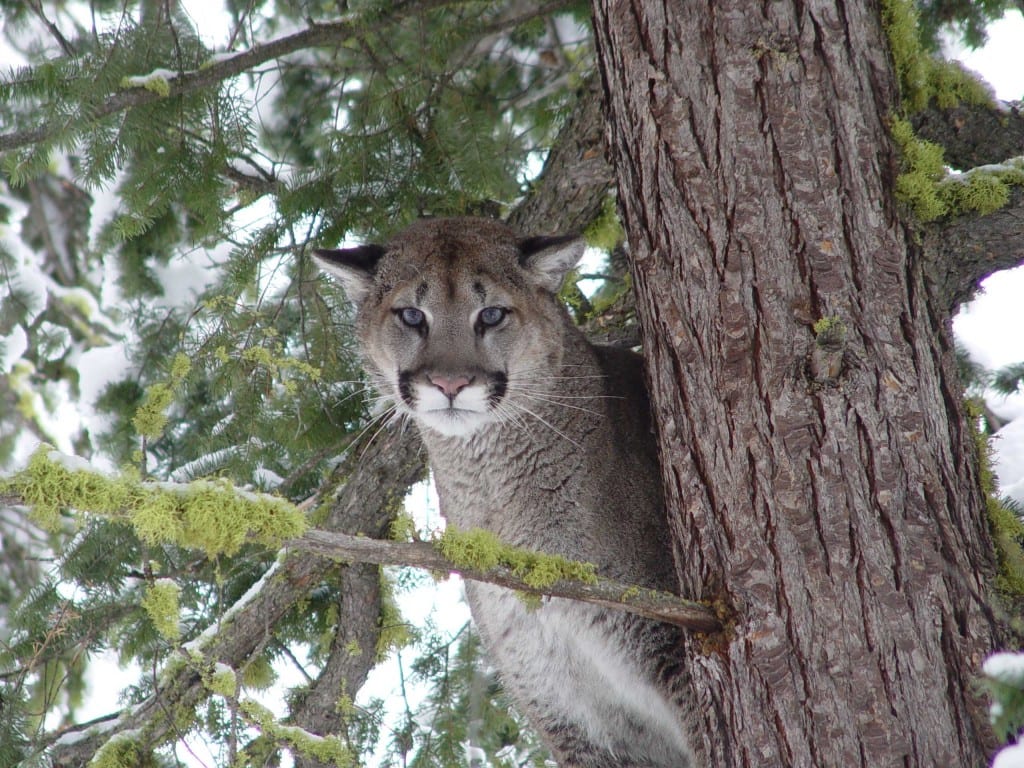 Two Western Washington University graduate student wildlife researchers who received some of their funding from Seattle City Light’s Wildlife Research Program won awards from the Washington and Oregon chapters of The Wildlife Society during the organization’s 2013 annual meeting.
Two Western Washington University graduate student wildlife researchers who received some of their funding from Seattle City Light’s Wildlife Research Program won awards from the Washington and Oregon chapters of The Wildlife Society during the organization’s 2013 annual meeting.
Two Western Washington University graduate student wildlife researchers who received some of their funding from Seattle City Light’s Wildlife Research Program won awards from the Washington and Oregon chapters of The Wildlife Society during the organization’s 2013 annual meeting.
Leslie Parks was awarded the 2013 Les Eberhardt Award for the Best Student Presentation. Her research, “Mountain Goat Population Connectivity in the Cascade Range of Washington and Southern British Columbia,” analyzed the genetic makeup of goats to identify significant barriers to movement by the animals that could be negatively impacting the overall health of the goat herds.
“The Washington mountain goat population has declined drastically since the 1950s. While this decline has been linked to historical overharvest, many populations within the state have not recovered and some historical habitat remains unoccupied,” Parks said. “The results of this research will be applied to inform management decisions to improve the viability of Washington’s mountain goats into the future.”
You can read Parks’ thesis online.
Matt Warren won the award for best poster presentation for his project, “Cougar Population Structure and Spatial Genetic Variation in the Pacific Northwest.” His findings add to the understanding of the cougar population and the cats’ dispersal patterns, which could help wildlife managers make more informed decisions regarding cougar populations and conflict management.
“I got interested in landscape genetics because it’s still a relatively new field and it is quickly growing and evolving, so it’s an exciting thing to be a part of,” Warren said. “As a kid I loved to pore over maps and catch frogs in the backyard, so this project, with the interplay between spatial analysis and wildlife ecology, was a natural fit.”
See Warren’s poster here.
Seattle City Light has a long history of supporting fish and wildlife research to monitor any potential impacts its dam operations might have on wildlife populations. To learn more about City Light’s wildlife research programs, visit www.seattle.gov/light/environment/wildlifegrant
City Light provided about $6,600 for Parks’ research and about $6,500 for Warren’s project. Since 1999, City Light has awarded about $136,000 in grants for mountain goat research at WWU, the University of Idaho, and the Washington Department of Fish and Wildlife and about $527,000 for studies on carnivores, such as grizzly and black bears, wolverines, cougars, and lynx, by researchers from Washington State University, Fish and Wildlife, Montana State University, and the U.S. Forest Service.
“Seattle City Light is proud of its long history of stewardship of the lands and waters in the Skagit watershed,” City Light Director of Environmental Affairs Lynn Best said. “The Wildlife Research Program is an important part of these efforts. It is an effective way for Seattle City Light to fund sound wildlife research projects in partnership with agencies, tribes and universities to improve our understanding and better protect these wildlife populations.”
Mountain goats live in alpine zone habitat and there are only about 100,000 worldwide. The Cascades used to be home to about 10,000 goats in the 1950s, but over-hunting reduced that population to less than 3,500 today. State wildlife managers cut the number of annual hunting permits to less than 20 by the 1990s, but the herds have not seen a significant recovery.
Parks said City Light’s grant allowed her to expand her study area into southern British Columbia, which hosts much larger herds of goats that could boost populations in the Cascades if they are able to continue intermingling. The grant also allowed Parks to hire five undergraduate student interns from Huxley College of the Environment in Bellingham to collect DNA samples.
Parks’ project used DNA samples that were collected in a variety of ways. Some came from blood and tissue samples collected when goats were tranquilized and fitted with radio tracking collars. Other samples came from carcasses that were found, hunter kills biopsy darting and scat samples.
Parks’ research shows that habitat loss is not the issue, said WWU Wildlife Sciences Prof. David Wallin, who oversaw the student researchers’ work. “Much to our surprise, the biggest factor was roads.”
To decrease inbreeding that reduces the fitness of the herds, Parks’ research suggests that animals from other areas should be introduced to increase the number of goats and enhance genetic diversity.
Cougar populations are healthy throughout the Pacific Northwest. An estimated 1,900 to 2,100 cougars live in Washington. State wildlife managers collected more than 1,000 DNA samples from cougars killed by hunters, but they had not analyzed the data to check on the genetic diversity of the cats in different areas of the state.
Because cougars can travel over 100 kilometers, game managers were skeptical about limitations on movement by the big cats that could inhibit genetic diversity.
Warren said his grant from City Light, in the form of a research assistantship, allowed him to devote the summer of 2012 to data analysis, and to be ready in the fall to collaborate with Prof. Dietmar Schwarz, a population geneticist at Western Washington University.
Warren’s research shows that there are at least four separate populations of cougars in Washington with distinctly identifiable genetic markers: a group in the Wallowa Mountains, one in northeast Washington, one in the Cascades and another in the Olympics. The open country in eastern Washington, the Okanagan Valley and the Puget lowlands appear to generally discourage travel by the cougars, although, periodically people do encounter cougars in suburban areas of Puget Sound as young cougars disperse from more remote areas.
The findings suggest that state game managers should treat those populations individually when making management decisions such as how many cougar licenses to issue in different areas of the state, Wallin said.
Seattle City Light’s Wildlife Research Program is an element of the wildlife mitigation plan that the City of Seattle, resources agencies, tribes, and other interveners agreed upon when the Skagit River Hydroelectric Project was granted a new license from the Federal Energy Regulatory Commission in 1995. Through the program, City Light awards grants each year to wildlife research projects that improve our understanding of wildlife in the North Cascades and that give new researchers opportunities to apply sound scientific studies at the region’s universities. Each year, grant recipients are selected through a competitive evaluation process led by City Light and the federal and state wildlife and resource management agencies.
The Wildlife Society is an international organization with a mission to represent and serve the professional community of scientists, managers, educators, technicians, planners, and others who work actively to study, manage, and conserve wildlife and its habitats worldwide. The 2013 Washington/Oregon meeting where the award winners were selected was attended by approximately 250 professional biologists, university faculty members, and graduate and undergraduate students from across the two states. Les Eberhardt was a wildlife ecologist with Pacific Northwest Lab, who died in a plane crash in 1992.
Seattle City Light is the 10th largest public electric utility in the United States. It has some of the lowest cost customer rates of any urban utility, providing reliable, renewable and environmentally responsible power to nearly 1 million Seattle area residents. City Light has been greenhouse gas neutral since 2005, the first electric utility in the nation to achieve that distinction.



